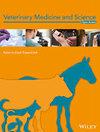确定不同锌源在生产期末对蛋鸡生产性能、鸡蛋质量和免疫系统的最佳水平和影响
IF 1.8
3区 农林科学
Q2 VETERINARY SCIENCES
引用次数: 0
摘要
背景锌、镁和铜等微量元素对提高肉种鸡的生产性能和健康水平以及鸡胚胎的发育至关重要。本研究旨在确定不同锌源对生产期末蛋鸡的生产性能、鸡蛋质量和免疫系统的最佳水平和影响。方法本实验涉及 520 只 80 周龄的 Lohmann LSL 蛋鸡,分为 13 个处理,5 个重复,每个重复 8 只鸡。母鸡饲喂添加了 40、60 和 80 毫克/千克锌的日粮,锌的来源有多种:矿物氧化锌、矿物硫酸锌、甘氨酸螯合有机锌和有机酸螯合有机锌。测量的主要参数包括体重、蛋重和免疫反应。结果基础日粮含锌量为 63.58 毫克/千克,根据 Lohmann LSL 指南,需要量为 80 毫克/千克。补锌后的第二个月体重明显增加,80 毫克/千克是最佳剂量。与对照组相比,氧化锌明显增加了蛋重。母鸡利用了各种来源的锌,从而增加了体重并改善了鸡蛋质量等参数。结论 适当水平的锌补充可提高蛋鸡的生产性能和鸡蛋质量,尤其是在生产末期。补充适当水平的锌可提高蛋鸡的生产性能和鸡蛋质量,尤其是在生产末期。锌可提高生物利用率,丰富鸡蛋的营养,缓解与年龄相关的生产性能下降。本文章由计算机程序翻译,如有差异,请以英文原文为准。
Determining the optimal level and the effect of different zinc sources on performance, egg quality and the immune system of laying hens at the end of the production period
BackgroundTrace elements, such as zinc, magnesium and copper, are essential for improving the performance and health of broiler breeders and the development of chicken embryos. These elements are integral to various proteins involved in metabolism, hormone secretion and the immune system, necessitating their inclusion in small amounts in poultry diets.ObjectivesThis study aimed to determine the optimal level and effect of different zinc sources on performance, egg quality and the immune system of laying hens at the end of the production period.MethodsThe experiment involved 520 Lohmann LSL laying hens, aged 80 weeks, divided into 13 treatments with 5 replications and 8 birds per replication. The hens were fed diets supplemented with 40, 60 and 80 mg/kg of zinc from various sources: mineral zinc oxide, mineral zinc sulphate, organic zinc chelated with glycine and organic zinc chelated with an organic acid. Key parameters measured included body weight, egg weight and immune response.ResultsThe basal diet contained 63.58 mg/kg of zinc, with the requirement per the Lohmann LSL guideline being 80 mg/kg. Zinc supplementation significantly increased body weight in the second month, with 80 mg/kg being the optimal dose. Zinc oxide notably increased egg weight compared to the control. The hens utilized zinc from all sources, resulting in weight gain and improved parameters such as egg quality. Immune parameters were also positively influenced by zinc supplementation.ConclusionsZinc supplementation at appropriate levels enhances the performance and egg quality of laying hens, particularly at the end of the production period. It improves bioavailability, enriches eggs and mitigates age‐related declines in productivity.
求助全文
通过发布文献求助,成功后即可免费获取论文全文。
去求助
来源期刊

Veterinary Medicine and Science
Veterinary-General Veterinary
CiteScore
3.00
自引率
0.00%
发文量
296
期刊介绍:
Veterinary Medicine and Science is the peer-reviewed journal for rapid dissemination of research in all areas of veterinary medicine and science. The journal aims to serve the research community by providing a vehicle for authors wishing to publish interesting and high quality work in both fundamental and clinical veterinary medicine and science.
Veterinary Medicine and Science publishes original research articles, systematic reviews, meta-analyses, and research methods papers, along with invited editorials and commentaries. Original research papers must report well-conducted research with conclusions supported by the data presented in the paper.
We aim to be a truly global forum for high-quality research in veterinary medicine and science, and believe that the best research should be published and made widely accessible as quickly as possible. Veterinary Medicine and Science publishes papers submitted directly to the journal and those referred from a select group of prestigious journals published by Wiley-Blackwell.
Veterinary Medicine and Science is a Wiley Open Access journal, one of a new series of peer-reviewed titles publishing quality research with speed and efficiency. For further information visit the Wiley Open Access website.
 求助内容:
求助内容: 应助结果提醒方式:
应助结果提醒方式:


